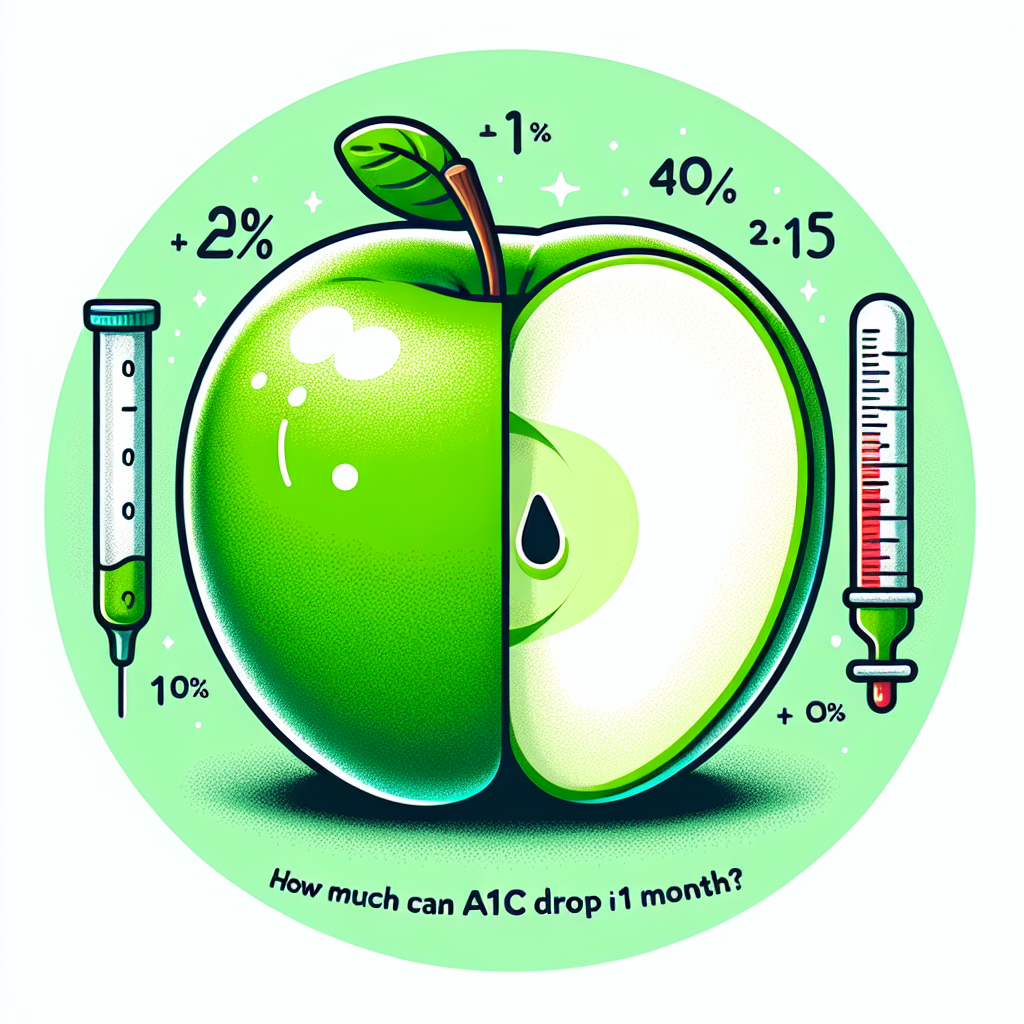Have you ever wondered how much your A1C levels can decrease in just one month? It’s a question that many individuals with diabetes ask themselves, and the answer may surprise you. A1C, a measure of long-term blood glucose control, can vary significantly from person to person. However, with proper management and lifestyle changes, it is possible to see a significant drop in your A1C levels within just one month. In this article, we will explore the factors that can influence A1C levels and discuss strategies to help you achieve a healthier range. So, get ready to discover how you can make a positive impact on your A1C in just 30 days!

Factors Affecting A1C Levels
Dietary Choices
Your dietary choices play a significant role in affecting your A1C levels. Consuming a balanced and healthy diet is crucial for managing diabetes and keeping your A1C levels within a healthy range. Opting for whole grains, lean proteins, fruits, vegetables, and healthy fats can help regulate blood sugar levels. On the other hand, consuming large amounts of refined sugars, saturated fats, and processed foods can lead to spikes in blood sugar and negatively impact your A1C levels.
Physical Activity
Engaging in regular physical activity is another important factor in managing your A1C levels. Exercise helps your body utilize insulin more effectively, leading to better blood sugar control. Aim for at least 150 minutes of moderate-intensity aerobic activity, such as brisk walking or cycling, spread throughout the week. Additionally, including strength training exercises twice a week can help improve insulin sensitivity and overall glucose control.
Medication Management
Properly managing your diabetes medications is essential for maintaining healthy A1C levels. Whether you take oral medications or insulin injections, it is important to adhere to your prescribed treatment regimen. Compliance with medication schedules and following your healthcare provider’s instructions regarding dosages and frequency can significantly impact your A1C levels. It is important to work closely with your healthcare team to monitor your medication needs and make any necessary adjustments.
Stress Levels
Stress can have a significant impact on your blood sugar levels and subsequently on your A1C levels. When you are stressed, your body releases hormones that can cause blood sugar to rise. Finding effective stress management techniques, such as deep breathing exercises, meditation, or engaging in hobbies you enjoy, can help reduce stress levels and stabilize blood sugar. It is important to prioritize stress reduction in your daily routine to positively impact your A1C levels.
Quality of Sleep
Getting adequate and quality sleep is vital for overall health and can also impact your A1C levels. Lack of sleep can disrupt hormone regulation and lead to increased insulin resistance. Aim for seven to nine hours of restful sleep each night to support optimal blood sugar control. Establish a consistent sleep schedule and create a relaxing bedtime routine to improve the quality of your sleep and positively affect your A1C levels.
Overall Health and Wellness
Maintaining overall health and wellness is crucial for managing your A1C levels. Regular check-ups with your healthcare provider, proper management of any other health conditions you may have, and achieving a healthy weight can all contribute to better blood sugar control. It is important to prioritize your overall well-being and stay proactive about managing your diabetes to achieve and maintain healthy A1C levels.
Average A1C Reduction
General Expectations
When it comes to A1C reduction, it is important to have realistic expectations. On average, a reduction of 0.5% to 1% in your A1C level is considered achievable and significant within a one to three month timeframe. However, please keep in mind that each individual’s response may vary based on various factors such as starting A1C level, adherence to treatment, and overall health.
Individual Variations
It is essential to recognize that everyone’s diabetes management journey is unique. The rate at which your A1C levels decrease can vary depending on factors such as your diabetes type, age, overall health, and genetics. Some individuals may see a rapid reduction in A1C levels, while others may experience a more gradual decline. It is important not to compare your progress to others and focus on your individual goals and achievements.
Starting A1C Levels
Your starting A1C level will play a significant role in determining how much it can drop within a month. Generally, individuals with higher starting A1C levels tend to experience more significant reductions. However, it is important to note that even if your A1C level is already within a healthy range, making efforts to lower it further can have long-term benefits for your diabetes management and overall health.
Compliance with Treatment
Consistent compliance with your diabetes treatment plan is crucial for achieving a reduction in A1C levels. Adhering to medication schedules, following dietary guidelines, and participating in regular physical activity are all integral parts of successful diabetes management. It is important to communicate openly with your healthcare provider and discuss any challenges or barriers you may encounter to ensure you stay on track with your treatment plan.
Medical Guidance and Support
Seeking medical guidance and support is essential in your A1C reduction journey. Your healthcare provider can offer valuable insights and recommendations specifically tailored to your unique needs. Regular check-ups, medication adjustments, and ongoing education about diabetes management can all contribute to achieving and maintaining healthy A1C levels. Do not hesitate to reach out to your healthcare team for assistance and guidance throughout your A1C reduction journey.
Healthy Lifestyle Changes
Healthy Eating Habits
Adopting healthy eating habits is an integral part of managing your A1C levels. Focus on consuming a well-balanced diet that includes whole grains, lean proteins, fruits, vegetables, and healthy fats. Limit your intake of processed foods, sugary snacks, and beverages high in added sugars. Be mindful of portion sizes and strive to have regular meal times throughout the day. Working with a registered dietitian can provide personalized guidance on meal planning and carbohydrate counting to help effectively manage your blood sugar levels.
Regular Exercise Routine
Incorporating regular exercise into your routine is vital for managing your A1C levels. Engage in a variety of physical activities, such as brisk walking, swimming, cycling, or dancing. Aim for at least 150 minutes of moderate-intensity aerobic exercise per week, and include strength training exercises twice a week. Be sure to consult with your healthcare provider before starting a new exercise regimen and monitor your blood sugar levels during physical activity.
Weight Management
Maintaining a healthy weight is crucial for managing your A1C levels. If you are overweight or obese, losing even a small amount of weight can have a positive impact on your blood sugar control. Focus on implementing a well-balanced diet and regular exercise routine to achieve gradual and sustainable weight loss. Consult with your healthcare provider or a registered dietitian to develop a personalized weight management plan that supports your overall diabetes management goals.
Stress Reduction Techniques
Effective stress management is essential for maintaining healthy A1C levels. Stress can cause blood sugar levels to rise, so implementing stress reduction techniques can help promote better blood sugar control. Engaging in activities such as meditation, deep breathing exercises, yoga, or engaging in hobbies you enjoy can help reduce stress levels. Prioritize self-care and make time for relaxation and stress-relieving activities in your daily routine.
Adequate Sleep Schedule
Getting sufficient and quality sleep is crucial for managing your A1C levels. Sleep deprivation can impair insulin sensitivity and lead to higher blood sugar levels. Aim for seven to nine hours of restful sleep each night by establishing a consistent sleep schedule and creating a relaxing bedtime routine. Avoid consuming caffeine or engaging in stimulating activities close to bedtime to promote better sleep quality.
Specific Dietary Approaches
Low-Carb Diet
A low-carb diet is a dietary approach that focuses on reducing carbohydrate intake to improve blood sugar control. By limiting the consumption of foods high in carbohydrates, such as bread, pasta, and sugary snacks, individuals may notice a reduction in their A1C levels. This approach can help stabilize blood sugar levels and reduce the need for excessive insulin or medication. However, it is important to work with a registered dietitian or healthcare provider to ensure a well-balanced and nutritionally adequate diet.
Mediterranean Diet
The Mediterranean diet is a well-known dietary approach that emphasizes plant-based foods, whole grains, lean proteins, healthy fats, and moderate consumption of red wine. This diet has been associated with numerous health benefits, including improved blood sugar control. The abundance of fruits, vegetables, whole grains, and monounsaturated fats in the Mediterranean diet can positively impact A1C levels and overall diabetes management. Seek guidance from a registered dietitian to incorporate the Mediterranean diet into your lifestyle.
DASH Diet
The DASH (Dietary Approaches to Stop Hypertension) diet is a dietary approach focused on reducing sodium intake and increasing the consumption of fruits, vegetables, whole grains, and lean proteins. While primarily designed to lower blood pressure, the DASH diet also has implications for diabetes management. By incorporating this eating plan, individuals may experience improvements in their A1C levels and overall health. Consult with a registered dietitian or healthcare provider for personalized guidance.
Plant-Based Diet
A plant-based diet emphasizes the consumption of foods derived from plants, such as fruits, vegetables, whole grains, legumes, nuts, and seeds, while minimizing or avoiding animal products. This dietary approach has been associated with improved blood sugar control and a reduced risk of developing type 2 diabetes. Plant-based diets are typically rich in fiber and low in saturated fats, contributing to better A1C levels and overall health. Consider working with a registered dietitian to ensure proper nutrient intake and to tailor a plant-based diet to your specific needs.
Glycemic Index Awareness
Understanding and considering the glycemic index (GI) of foods can be beneficial for managing your A1C levels. The glycemic index ranks carbohydrates on a scale from 0 to 100 based on how they affect blood sugar levels. Foods with a higher GI can cause a more significant increase in blood sugar, while those with a lower GI tend to have a more gradual impact. Incorporating low GI foods into your meals and snacks can help regulate blood sugar levels and positively influence your A1C levels.

Adjusting Medication
Prescribed Medications
If you are taking medications to manage your diabetes, it is crucial to follow your healthcare provider’s instructions and adhere to the prescribed treatment plan. Consistently taking your medications as directed can help regulate blood sugar levels and improve your A1C levels. It is important to communicate any concerns or side effects you may experience to your healthcare provider to ensure appropriate adjustments can be made if necessary.
Insulin Dosage
For individuals with type 1 diabetes or type 2 diabetes who require insulin therapy, adjusting insulin dosage according to blood sugar levels is essential for maintaining target A1C levels. Regular monitoring of blood sugar levels and working closely with your healthcare provider can help determine the appropriate insulin dosage. It is important to carefully follow your healthcare provider’s instructions and inform them of any changes in your blood sugar levels or lifestyle.
Oral Medication
For individuals with type 2 diabetes who take oral medications, consistent and proper use is crucial for effectively managing blood sugar levels. Oral medications work in various ways to lower blood sugar, and adherence to the prescribed treatment plan is essential for achieving target A1C levels. Be sure to take your medications as directed, report any side effects, and discuss any concerns or questions with your healthcare provider.
Monitoring Blood Sugar Levels
Regular monitoring of your blood sugar levels is integral to understanding how your medications are working and how they affect your A1C levels. By monitoring blood sugar levels, you can identify patterns, make adjustments to your treatment plan if necessary, and stay proactive in managing your diabetes. Follow your healthcare provider’s recommendations on testing frequency and techniques to ensure accurate and reliable results.
Collaboration with Healthcare Provider
Collaborating with your healthcare provider is essential when it comes to adjusting medication. Regular check-ups and open communication with your healthcare team allow for ongoing assessment and potential modifications to your treatment plan. Your healthcare provider can provide guidance on medication adjustments, recommend additional medication options, or suggest alternative therapies to help you achieve and maintain target A1C levels.
Incorporating Exercise
Types of Exercise
Incorporating various types of exercise into your routine is important for managing your A1C levels. Both aerobic exercises, such as walking, jogging, swimming, or cycling, and strength training exercises have unique benefits. Aerobic exercises improve insulin sensitivity and help regulate blood sugar levels, while strength training exercises promote muscle development and can aid in glucose control. Aim for a combination of both types of exercises to maximize the benefits for your A1C levels and overall health.
Intensity and Duration
Finding the right balance of intensity and duration is important when incorporating exercise into your routine. Moderate-intensity exercises, such as brisk walking or recreational cycling, are generally recommended for most individuals. Gradually increase the duration and intensity to ensure a safe and effective workout. Strive for at least 150 minutes of moderate-intensity aerobic exercise spread throughout the week, along with strength training exercises twice a week.
Consistency
Consistency is key when it comes to benefiting from exercise and managing your A1C levels. Aim to engage in physical activity on a regular basis rather than sporadically. Consistency helps maintain insulin sensitivity and keeps blood sugar levels more stable over time. Find activities you enjoy and can incorporate into your daily routine to increase the likelihood of consistent participation.
Safety Precautions
Prioritizing safety while exercising is important, especially when managing diabetes. Always consult with your healthcare provider before starting a new exercise regimen, particularly if you have any underlying health conditions. Consider wearing a medical ID bracelet or carrying identification in case of emergency. It is essential to monitor your blood sugar levels before, during, and after exercise to prevent hypoglycemia or hyperglycemia. Stay hydrated, wear appropriate footwear, and be mindful of any warning signs or symptoms that require attention.
Monitoring Blood Sugar During Exercise
Regularly monitoring your blood sugar levels during exercise is crucial to ensure safe and effective diabetes management. Check your blood sugar prior to starting the exercise and periodically throughout the activity, especially if engaging in more intense or prolonged exercises. If your blood sugar levels are too low or too high, adjust your intake of carbohydrates or insulin accordingly. Consult with your healthcare provider on individualized blood sugar targets during exercise and how to handle any fluctuations.

Non-Medical Approaches
Stress Reduction Techniques
In addition to affecting blood sugar levels, stress can impact your overall well-being. Implementing stress reduction techniques can positively influence your A1C levels and improve your quality of life. Engage in activities such as deep breathing exercises, meditation, yoga, or engaging in hobbies you enjoy. Finding healthy ways to cope with stress can help you better manage your blood sugar levels and promote overall well-being.
Quality of Sleep Improvement
Improving the quality of your sleep can have a positive impact on managing your A1C levels. Establishing a consistent sleep schedule, creating a relaxing bedtime routine, and practicing good sleep hygiene can significantly enhance your sleep quality. Avoid consuming caffeine or engaging in stimulating activities close to bedtime and create a sleep-friendly environment that is dark, quiet, and comfortable. Prioritizing adequate and restful sleep supports optimal blood sugar control.
Quitting Smoking
Smoking has detrimental effects on overall health, including blood sugar control. If you smoke, quitting is crucial for managing your A1C levels and reducing the risk of diabetes-related complications. Seek support from healthcare professionals or quit-smoking programs to develop a quitting plan that works best for you. Quitting smoking not only positively impacts your A1C levels but also improves your overall health and longevity.
Hydration and Alcohol Consumption
Staying hydrated is important for managing your A1C levels and overall health. Water helps regulate blood sugar levels, supports proper bodily functions, and aids in maintaining balanced blood sugar levels. Avoid sugary beverages and opt for water as the primary source of hydration. Additionally, moderate alcohol consumption can be incorporated into a healthy lifestyle. However, it is important to be mindful of the type and amount of alcohol consumed, as excessive alcohol consumption can lead to unstable blood sugar levels.
Importance of Regular Check-ups
Regular check-ups with your healthcare provider are vital for managing your diabetes and A1C levels effectively. Routine visits allow for monitoring of your progress, potential adjustment of your treatment plan, and identification of any underlying health conditions that may impact your A1C levels. Stay proactive in scheduling regular check-ups and discuss any concerns, questions, or changes in your health with your healthcare provider.
Monitoring A1C Levels
Frequency of Testing
Monitoring your A1C levels on a regular basis is vital for tracking your diabetes management progress. The frequency at which you should test your A1C levels may vary based on factors such as your current A1C level, treatment plan, and overall health. Typically, it is recommended to test your A1C levels at least twice a year. However, your healthcare provider may recommend more frequent testing to closely monitor your progress and make any necessary adjustments to your treatment plan.
Self-Monitoring vs. Laboratory Tests
Self-monitoring of blood glucose (SMBG) is a common approach for tracking blood sugar levels at home. While SMBG provides immediate feedback and helps you make real-time adjustments, A1C testing through laboratory tests provides a more comprehensive view of your overall blood sugar control over three months. Both methods are valuable in managing your diabetes, and it is important to discuss with your healthcare provider which approach is best suited for your individual needs.
Interpreting Results
Understanding and interpreting your A1C test results is essential for effectively managing your diabetes. A1C is reported as a percentage and represents the average blood sugar levels over the past two to three months. Generally, an A1C level below 5.7% is considered normal, while a level between 5.7% and 6.4% indicates prediabetes, and a level of 6.5% or higher indicates diabetes. Work closely with your healthcare provider to set target A1C goals based on your individual circumstances.
Discussing with Healthcare Provider
Regularly discussing your A1C test results with your healthcare provider is important for maintaining optimal diabetes management. Your healthcare provider can help interpret your results, explain how they relate to your overall health, and recommend necessary adjustments to your treatment plan. Use these discussions to ask questions, express concerns, and seek guidance on how to achieve and maintain your target A1C levels.
Tracking Progress Over Time
Tracking your A1C levels over time is crucial for assessing the effectiveness of your diabetes management strategies. By comparing past A1C results with current ones, you can evaluate the impact of lifestyle changes, medication adjustments, and other factors on your A1C levels. This information can guide you and your healthcare provider in making further modifications, setting realistic goals, and celebrating achievements along your diabetes management journey.

Challenges and Obstacles
Emotional and Mental Well-being
Managing diabetes can present emotional and mental challenges that may impact your A1C levels. Stress, anxiety, depression, and burnout can affect your motivation, adherence to treatment plans, and overall diabetes management. It is important to prioritize your emotional and mental well-being by seeking support from healthcare professionals, therapists, and support groups. Practice self-care, engage in activities you enjoy, and communicate openly with your loved ones about your feelings and challenges.
Motivation and Commitment
Sustaining motivation and commitment in managing your A1C levels can sometimes be challenging. Diabetes management is a lifelong journey that requires dedication and consistency. Set realistic goals, celebrate achievements, and remind yourself of the long-term benefits of maintaining healthy A1C levels. Seek support from healthcare providers, diabetes educators, or support groups to help you stay motivated and committed to your diabetes management plan.
Social Support
Having a strong support system is crucial for effectively managing your A1C levels. Friends, family, and loved ones can provide emotional support, understanding, and encouragement throughout your diabetes management journey. Joining support groups, both in-person and online, can also provide a sense of community and the opportunity to connect with individuals facing similar challenges. Openly communicate your needs with your support system and take advantage of the support available to you.
Overcoming Plateaus
Experiencing plateaus in your A1C reduction journey is not uncommon. At times, despite your best efforts, you may notice that your A1C levels remain stable for a period. If you encounter a plateau, do not be discouraged. Reevaluate your current strategies, seek advice from your healthcare provider, and consider making adjustments to your treatment plan or lifestyle. Remember that progress is not always linear, and with persistence and resilience, you can overcome plateaus and continue to work towards healthier A1C levels.
Managing Health Conditions
Managing other health conditions, such as hypertension or high cholesterol, alongside diabetes can present additional challenges in achieving optimal A1C levels. Collaborate with your healthcare provider to develop a comprehensive treatment plan that addresses all your health conditions. This may involve lifestyle modifications, medication adjustments, and close monitoring of all relevant health parameters. Managing your overall health can positively influence your A1C levels and enhance your overall well-being.
Seeking Professional Guidance
Diabetes Educators
Diabetes educators are healthcare professionals who specialize in providing education, guidance, and support to individuals living with diabetes. Working with a diabetes educator can provide you with the knowledge and skills necessary to manage your diabetes and achieve healthy A1C levels. Diabetes educators can assist you in understanding your treatment plan, monitoring your blood sugar, making dietary adjustments, and incorporating exercise into your routine. They are an invaluable resource in helping you navigate the challenges of diabetes management.
Registered Dietitians
Registered dietitians are experts in nutrition and can play a crucial role in managing your A1C levels. They can provide personalized guidance on healthy eating habits, meal planning, carbohydrate counting, and dietary adjustments specific to your diabetes management goals. By working closely with a registered dietitian, you can develop a sustainable and balanced eating plan that supports optimal blood sugar control and contributes to healthier A1C levels.
Endocrinologists
Endocrinologists are medical specialists who diagnose and treat hormonal imbalances, including diabetes. Working with an endocrinologist can provide specialized care, expertise, and guidance for effectively managing your diabetes and achieving healthy A1C levels. Endocrinologists can help determine appropriate medication dosages, assess treatment plans, and offer recommendations based on the latest advancements in diabetes management. Collaborating with an endocrinologist can greatly enhance your diabetes management efforts.
Therapists
Therapists can provide valuable support for managing the emotional and mental aspects of living with diabetes. Diabetes can impact mental well-being, and therapists can help you develop coping strategies, address any underlying challenges, and maintain a positive mindset. Engaging in therapy can contribute to better mental health, which in turn can positively influence your motivation, commitment, and overall diabetes management, including your A1C levels.
Support Groups
Joining a support group can provide a sense of community, understanding, and encouragement as you navigate the challenges of diabetes management. Support groups allow you to connect with individuals who share similar experiences, share knowledge and strategies, and offer emotional support. Whether in-person or online, support groups can provide a platform for discussing concerns, celebrating achievements, and gathering inspiration from others who have successfully managed their diabetes and achieved healthy A1C levels.
In conclusion, there are various factors that can affect your A1C levels, including dietary choices, physical activity, medication management, stress levels, quality of sleep, and overall health and wellness. Making healthy lifestyle changes, such as adopting healthy eating habits, incorporating regular exercise, managing stress, and getting adequate sleep, can positively impact your A1C levels. Additionally, specific dietary approaches, adjusting medication, incorporating exercise safely, and implementing non-medical approaches such as stress reduction techniques and improving quality of sleep can all contribute to better blood sugar control and lower A1C levels. It is important to monitor your A1C levels regularly, discuss the results with your healthcare provider, and seek professional guidance from diabetes educators, registered dietitians, endocrinologists, therapists, and support groups to effectively manage your diabetes and maintain healthy A1C levels. Remember, it is a journey, and with commitment, support, and the right strategies, you can achieve and maintain healthy A1C levels for better overall diabetes management.


